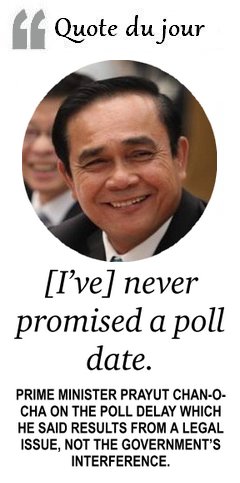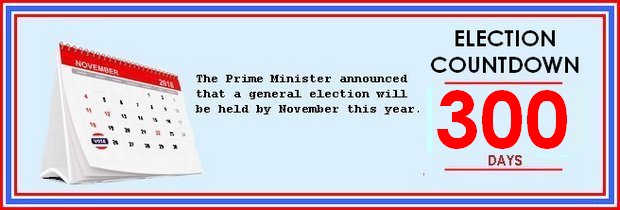
Prime Minister Prayut Chan-o-cha says he is non-committal on whether the National Council for Peace and Order (NCPO) will step down from power after the February 2019 general election.
He spoke to reporters after presiding over a ceremony to mark the 60th anniversary of the Armed Forces Academies Preparatory School in Nakhon Nayok. While Gen Prayut said the NCPO will end its mission according to the roadmap, he did not specify when.
Asked if the NCPO's mission will end in February 2019 -- a new tentative schedule for the general election which has been postponed from this November -- Gen Prayut only said that this was "a legal matter".
When pressed for clarification, Gen Prayut said he could not rush the law-making procedure as a joint meeting of concerned parties will need to be held to consider the organic bill on the election of MPs which cleared the National Legislative Assembly (NLA) last Thursday.

The next step is for a joint committee comprising the Election Commission (EC), the Constitution Drafting Committee (CDC) and the NLA to fine-tune the bill before submission for royal endorsement in March.
A 90-day period is needed for royal endorsement. The NLA voted to extend the enforcement of the organic bill on MP elections by another 90 days, which will effectively result in the general election being delayed until February 2019. The extension was proposed by the NLA panel vetting the bill on MP elections. The panel on Jan 19 voted for it to take effect only 90 days after it was passed and published in the Royal Gazette, instead of immediately.
According to the constitution, an election must be held within 150 days of the four election-related laws being promulgated, and Gen Prayut had tentatively announced that an election would be held this November. Deputy Prime Minister Wissanu Krea-ngam previously said if the bill is royally endorsed and becomes law in June, the National Council for Peace and Order will invite parties, the EC and various agencies to discuss the election date.
But critics have slammed the 90-day extension of the bill's enforcement, saying the NLA has used legal technicalities to help the regime cling on to power. Asked if the 90-day delay will be the last, Gen Prayut insisted that he was not responsible for the delay. "I haven't delayed anything," he said.
Asked if the government's popularity will be adversely affected if he will stay on in power longer than he has promised, the prime minister said he did not think this will have an impact. "Therefore, my promise remains unchanged ... I will do my best and everything will proceed according to the roadmap. But some groups want the same old things to come back. So, make a choice between me or a return to old things," Gen Prayut said.
However, politicians and academics yesterday came out to demand Gen Prayut keep his promise to hold the election this November. Democrat Party deputy leader Nipit Intarasombat told the Bangkok Post that the 90-day delay will only worsen matters as many people find it unacceptable. People thought Gen Prayut's promise for the November election was his last, but the poll has now been further delayed, which would only upset more people, Mr Nipit said.
Similar protests like those at Thammasat University and Siam Square would spread elsewhere, Mr Nipit said, adding police did not dare step in to arrest the participants for fear the situation would get out of hand.

Chusak Sirinil, chief of Pheu Thai Party's legal team, said while people were looking forward to the election being held this November, the prime minister had let them down with an explanation that was clearly flawed. Addressing Gen Prayut's challenge that the public to choose between himself and political parties, Mr Chusak said this clearly demonstrates Gen Prayut's intention to extend the poll date by painting a grim picture of the future to frighten people.
Weerasak Krueathep, a political scientist at Chulalongkorn University, said the prime minister has failed to stick to his election roadmap yet again. This time, Gen Prayut played "the NLA card" to delay the election for another 90 days, Mr Weerasak said.
Defending the 90-day extension of the organic bill's enforcement, NLA president Pornpetch Wichitcholchai said yesterday it is intended to give both parties enough time to prepare for the election, particularly primary voting procedures to select poll candidates, which could take more than 90 days.
Meanwhile, national police chief Chakthip Chaijinda yesterday said he has ordered a probe into the finances behind recent demonstrations held by anti-government elements such as the New Democracy Movement which is calling for an early election. Their voices join that of the People Go Network (PGN), an umbrella group of activists and academics which launched a 450km civic march from Pathum Thani to Khon Kaen last week.
The groups are opposed to delays in the election, the luxury watch scandal encircling the deputy prime minister, and curbs on people's rights.
- Commentary by Atiya: Regime cannot buy trust
